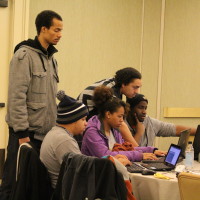Computing Research Association Tackles Diversity in Tech
Originally posted on Associations Now
By: Rob Stott
A recent Computing Research Association survey showed that, while more diverse than top tech companies, computer-science degree programs still struggle to court underrepresented students. CRA has a few programs aimed at combating that trend.
The issue of diversity in the tech industry—rather, the lack thereof—is nothing new. Last year, Google became one of the first major tech companies to open up about its lack of staff diversity. And while new reports from Facebook and Yahoo in the last few weeks claimed small gains in hiring diverse staff, the numbers are still hard to look at: Just 2 percent of Yahoo’s workforce and barely 1.5 percent of Facebook’s workforce are African American.
And despite the efforts of some to increase the diversity in computer-science (CS) undergraduate programs, the results just aren’t there yet.
“At CRA, we have this mission to improve the state of the computer research ecosystem, and this diversity piece is a really huge part of it.”
New data from a recent Computing Research Association (CRA) survey found that, while more students from underrepresented groups are obtaining advanced degrees in computer science, the numbers still lag far behind the typical white male. Last year, only 4.1 percent of the bachelor’s degrees awarded in CS went to black students and 7.7 percent went to Hispanic students, according to the survey of 121 U.S. and Canadian CS departments. Meanwhile 58 percent of the CS degrees went to white students.
The diversity problem extends to the gender discussion as well—86 percent of the CS undergraduate degrees went to male students.
The trends were similar for CS master’s degrees and doctoral programs.
“Undergraduate enrollments continue to go way up in the field—we’ve seen double digit increases every year since 2005—but what we don’t see, and what is a big problem for the field, for the country, and for our organization in particular, is that the diversity numbers aren’t great still,” said Peter Harsha, CRA’s director of government affairs. “At CRA, we have this mission to improve the state of the computer research ecosystem, and this diversity piece is a really huge part of it.”
It’s been a challenge because of the industry’s unwelcoming history with women and minorities, he admitted.
“There are a lot of stereotypes about what the typical computer scientist looks like, and so we’ve tried to do a lot of work to show that that’s not the reality of the situation,” Harsha said. “We want students to understand that computer science has this wide variety of careers, and very few of them are stuck in front of a computer screen for 12 hours a day.”
That work includes a number of programs aimed at exposing underrepresented students to professionals in different CS fields and giving them the tools and resources needed to be successful.
“Our most successful of these programs is the grad cohort program. And looking at the sponsorships for that program, you’ll see a long list of familiar names like Google and Microsoft,” he said. “We bring in 360 underrepresented students at a time and coach them through what it takes to be successful in their grad career, how to get to that first or next job, the differences between going into industry or academia, and everything from resume services to finding the right mentor.”
Harsha said the goal of these programs is to show that CS is a collaborative environment and that the problems these students will solve are designed for the social good. “The idea that the field is rich with both intellectual challenges, but also rich with opportunities to change the world, is the thread that gets embedded into everything that we do,” he said.
Original Article






